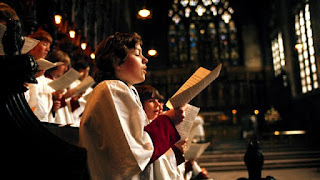 |
| Wide angle view of St John's College Chapel, Cambridge |
Settling into Cambridge has involved adjusting to the rhythms of worship in this place. Many of the colleges of the University have their own chapel and choir. Some colleges have an evening prayer service every day of the week. This in a country with only 10% of the population attending church. In the Anglican tradition this is evening prayer is commonly called "Evensong" because many of the prayers are sung.
 |
| St John's College Choir, Cambridge |
I include along with my photos, some photos from the internet to give different views of chapels and choirs, which one isn't allowed to photograph during a service.
So far we have attended evensong at St John's College and Kings College in Cambridge, as well as St Paul's Cathedral in London, and Ely Cathedral. We have also taken part in the "daily offices" of prayer and worship at Westminster College where we are staying.
As I mentioned in an earlier blog, it has taken some time to get used to the differences, but in doing so we have felt God impressing on us the importance of public reading of the Bible, so we hear large pieces of God's word. Of course the Bible was originally a book that people heard rather than read - in the days when only the privileged few were able to read.
 |
| In the choir of Ely Cathedral looking West |
Last Sunday we spent the day in Ely and attended morning worship and evensong in the Ely Cathedral, the forth largest in England. This cathedral is also famous as a film location for movies such as Elizabeth: The Golden Age, The Kings Speech, Jupiter Ascending, and MacBeth. They did a great job of introducing evensong for those who were visiting. Among other things, they explained that daily services of worship had been conducted there for over 1300 years (although the present building is not quite 1000 years old, it was preceded by an Abby Church established on the site in AD672.) These services occurred whether or not there were people in the congregation. This seems silly to our pragmatic minds which are focused on worship services that connect with people in effective (a modern word) ways. Such thoughts aren't altogether wrong. I've been part of decisions to stop a worship service that no longer attracted sufficient people to worship. However, faithful daily worship for over 1300 centuries does provide a helpful corrective by reminding us that our worship is first and foremost for God. How different to our consumerism which would ask: "What did I get out of the service today?" God is worthy and deserves all our praise!
 |
| Sophie in her Choir Stall for Evensong |
The Choir (sometimes spelt Quire) is not just the people who sing, but originally describes the space in a church between the main congregation area (the Nave) and what pre-reformation churches called the altar. This is where the people sit, stand, kneel, sing and pray during evensong. The architecture makes it clear "the choir" aren't just singing for the congregation, they are primarily singing for God. I know some worship leaders who grasp this point and teach their worship teams that they are playing and singing first and foremost for God (not for themselves) - get that right and their responsibilities to sensitively lead the congregation in worship comes more easily!
 |
| My photo of roof of the Ely Nave |
 |
| Ely Cathedral as we walked back to the train. |
 |
| Looking Down from the West Tower, Ely Cathedral |
Interestingly, the statues and figures in the Lady Chapel of the cathedral were all headless or defaced. Who were the vandals you are wondering? The Reformers and Puritans who were concerned that the presence of these statues promoted idolatry. One man we spoke to after the morning service said, "We are lucky that the whole cathedral wasn't defaced as we had Oliver Cromwell living here."
 |
| Sue and Sophie in front of Oliver Cromwell's house. |
Depending on who you read and your historical viewpoint, Oliver Cromwell is either a hero, or an oppressive - some even argue genocidal - authoritarian leader.
Those who built the cathedral thought they were doing so to the glory of God. Those who defaced it did so out of zeal for God's glory.
Makes you wonder where our blind spots and excesses are!
 |
| Passing Kings College, Cambridge on my walk back to Westminster yesterday afternoon. Spring has sprung. |
Martin.
No comments:
Post a Comment